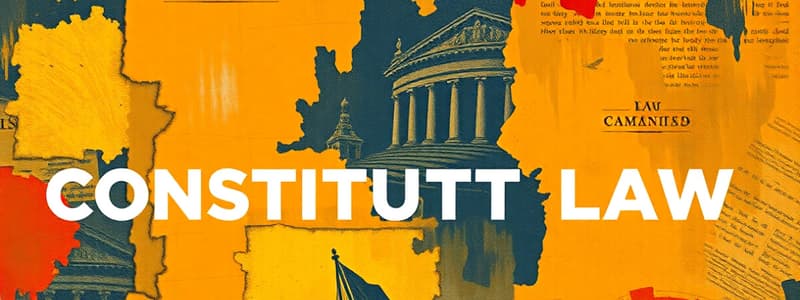Podcast
Questions and Answers
Which branch of law primarily deals with the rights and responsibilities within family relationships?
Which branch of law primarily deals with the rights and responsibilities within family relationships?
- Contract Law
- Family Law (correct)
- Criminal Law
- Administrative Law
What is the key principle that ensures everyone is accountable under the law, regardless of their position or influence?
What is the key principle that ensures everyone is accountable under the law, regardless of their position or influence?
- Due Process
- Equal Protection
- Rule of Law (correct)
- Separation of Powers
Which branch of law addresses disputes between individuals or entities regarding property rights?
Which branch of law addresses disputes between individuals or entities regarding property rights?
- Property Law (correct)
- Administrative Law
- Tort Law
- Contract Law
Which branch of law defines crimes and determines punishments for those who commit them?
Which branch of law defines crimes and determines punishments for those who commit them?
What branch of law ensures that administrative agencies act within their legal authority and make fair decisions?
What branch of law ensures that administrative agencies act within their legal authority and make fair decisions?
Which of the following is NOT a branch of law discussed in the text?
Which of the following is NOT a branch of law discussed in the text?
Which branch of law focuses on establishing remedies for wrongs caused by negligent or intentional actions?
Which branch of law focuses on establishing remedies for wrongs caused by negligent or intentional actions?
Which branch of law focuses on ensuring agreements between individuals and businesses are upheld and provides mechanisms for resolving disputes?
Which branch of law focuses on ensuring agreements between individuals and businesses are upheld and provides mechanisms for resolving disputes?
Which principle assumes that a person is innocent until proven guilty?
Which principle assumes that a person is innocent until proven guilty?
What is the primary source of law in a civil law system?
What is the primary source of law in a civil law system?
Which of the following is NOT a source of law?
Which of the following is NOT a source of law?
What is the main function of the judicial branch of government, as outlined by the principle of separation of powers?
What is the main function of the judicial branch of government, as outlined by the principle of separation of powers?
What is the purpose of the trial process?
What is the purpose of the trial process?
Which of these is NOT a function of a lawyer?
Which of these is NOT a function of a lawyer?
What is the primary difference between common law and civil law systems?
What is the primary difference between common law and civil law systems?
Which of the following is an example of a legal professional?
Which of the following is an example of a legal professional?
What does the principle of 'equality before the law' mean?
What does the principle of 'equality before the law' mean?
Which of the following is NOT a core component of legal ethics?
Which of the following is NOT a core component of legal ethics?
Flashcards
Constitutional Law
Constitutional Law
Deals with fundamental principles and structures of government, defining powers and limitations of government bodies and protecting individual rights.
Administrative Law
Administrative Law
Governs activities of administrative agencies, ensuring they act within legal authority and that their decisions are fair and justifiable.
Criminal Law
Criminal Law
Defines crimes and establishes punishments for violations, protecting society from harmful actions and ensuring accountability.
Civil Law
Civil Law
Signup and view all the flashcards
Contract Law
Contract Law
Signup and view all the flashcards
Property Law
Property Law
Signup and view all the flashcards
Family Law
Family Law
Signup and view all the flashcards
Rule of Law
Rule of Law
Signup and view all the flashcards
Separation of Powers
Separation of Powers
Signup and view all the flashcards
Presumption of Innocence
Presumption of Innocence
Signup and view all the flashcards
Equality before the Law
Equality before the Law
Signup and view all the flashcards
Statutes
Statutes
Signup and view all the flashcards
Case Law
Case Law
Signup and view all the flashcards
Constitutions
Constitutions
Signup and view all the flashcards
Common Law System
Common Law System
Signup and view all the flashcards
Civil Law System
Civil Law System
Signup and view all the flashcards
Judges
Judges
Signup and view all the flashcards
Confidentiality
Confidentiality
Signup and view all the flashcards
Study Notes
Branches of Law
- Constitutional Law: Deals with the fundamental principles and structures of government, defining the powers and limitations of government bodies and protecting individual rights. It establishes the framework for the operation of the state.
- Administrative Law: Governs the activities of administrative agencies of government. It ensures that these agencies act within their legal authority and that their decisions are fair and justifiable.
- Criminal Law: Defines crimes and establishes punishments for those who commit them. It protects society from harmful actions and ensures that those who violate the law are held accountable. Deals with the prosecution of individuals who violate the law.
- Civil Law: Deals with disputes between private individuals or entities. It focuses on resolving conflicts and establishing remedies, often involving compensation for damages. Protects individuals' rights and property from infringement by other individuals, while also aiming to resolve conflicts fairly.
- Contract Law: Governs agreements made between individuals and businesses. It ensures that contractual obligations are met and provides mechanisms for resolving contractual disputes, establishing frameworks for private agreements and ensuring those agreements are honored.
- Property Law: Deals with ownership and transfer of property rights, both real and personal. It establishes mechanisms for acquiring, transferring, and protecting property rights.
- Family Law: Governs matters relating to family relationships, such as marriage, divorce, child custody, and adoption. Focuses on relationship rights and responsibilities, often regarding family matters.
- Tort Law: Deals with civil wrongs that result in harm to another person or their property. It seeks to provide compensation to those injured by the negligent or intentional actions of others, establishing frameworks under which individuals can seek compensation for damages incurred by another's actions.
Key Principles of Law
- Rule of Law: Ensures that everyone is subject to and accountable under the law, regardless of their position or influence. It safeguards against arbitrary exercises of power and ensures fairness in the application of the law.
- Due Process: Guarantees fair treatment under the law, including the right to a fair trial and access to legal representation. This principle outlines how the law should be dealt with to avoid bias and assure fair treatment of all involved.
- Separation of Powers: Divides governmental authority among different branches, often legislative, executive, and judicial, to prevent tyranny and promote checks and balances. Separates legislative (lawmaking), executive (law enforcement), and judicial (interpreting the law) functions.
- Presumption of Innocence: A fundamental principle in criminal trials, assuming the defendant is innocent until proven guilty beyond a reasonable doubt. This assumes the individual is innocent unless demonstrated otherwise through a judicial process of evidence and testimony.
- Equality before the Law: Ensures that all individuals are treated equally under the law, regardless of their social status, background, or other factors. Guarantees equitable treatment under the law, preventing bias and prejudice.
Sources of Law
- Statutes: Laws enacted by legislatures, covering a wide range of topics. They are written law often passed by legislatures.
- Case Law: Decisions made by courts in specific cases, which establish precedents for future cases. They are interpretations of law and statutes from past court decisions.
- Constitutions: Fundamental laws defining and limiting the powers of a government, establishing the foundation for the entire legal system. Defining and regulating the functions of the government through specific rules and regulations.
- Treaties and International Law: Agreements between nations governing various aspects of international relations. These agreements are legally binding and govern relations between nations.
- Regulations: Rules created by administrative agencies to implement statutes and direct the agencies' functions. These regulations are often specific interpretations of legislation to ensure the legislature's intentions are followed.
Legal Systems
- Common Law System: Based on precedents and judicial decisions, where judges interpret and apply the law, developing a body of legal principles over time. It relies on past decisions to guide future ones, drawing precedent from existing legal rulings.
- Civil Law System: Based on codified laws, where statues are the primary source of law, and judges apply these codes to specific situations. The system is structured around a broad system of statutes and codes rather than case law precedent.
Legal Professionals
- Judges: Interpret and apply the law in court proceedings, presiding over trials and making rulings.
- Lawyers/Attorneys: Represent clients in legal matters, providing advice, advocating for their interests, and preparing legal documents. They serve as advocates for their clients, guiding them through legal processes.
- Paralegals: Assist lawyers with various legal tasks, including research, document preparation, and client communication.
Legal Procedure
- Court Systems: Structures and hierarchies of courts for hearing and resolving legal disputes, each serving specific regions or jurisdictions. These courts function across hierarchies to serve an entire judicial region and deliver judgments.
- Trial Process: Consists of stages such as pleadings, discovery, motions, trial, and appeal, with specific rules governing each step. These are sequential steps taken to address complaints and find a resolution.
Legal Ethics
- Professional Responsibility: Rules guiding the conduct and behavior of legal professionals to ensure integrity and uphold the public's trust in the justice system. It guides individuals regarding proper behavior in legal settings.
- Confidentiality: Maintaining the privacy of client information is essential to maintain trust and confidentiality in legal relationships.
Studying That Suits You
Use AI to generate personalized quizzes and flashcards to suit your learning preferences.




